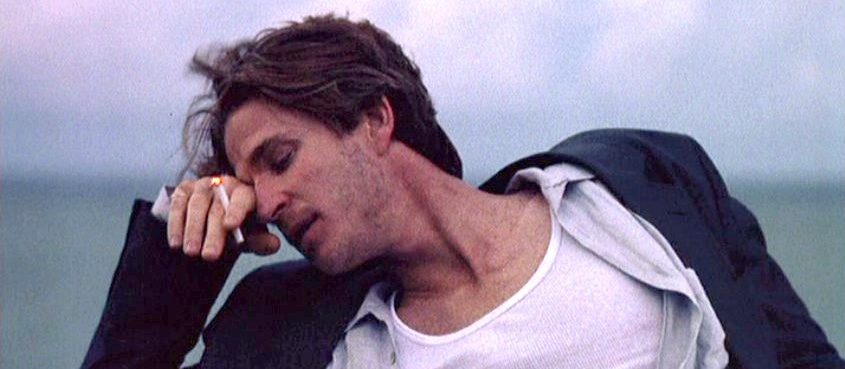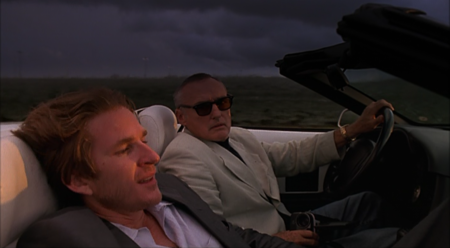

“How can I love you back, when I don’t even love myself?”
My thoughts on The Blackout are split. I knew I couldn’t expect it to be anything like Ms .45—which I had seen only a few weeks prior—but that’s where my head was at. Instead, Abel Ferrara’s grimy freak-out is slimy and repulsive as it sketches out a hazy story about a depraved movie star trying to piece together the events of a wild night lost to chemical excess. It’s a far cry from the stylish sleaze of his sophomore feature. Even though I was more or less expecting it, I was caught slightly off guard by the film’s blunt showcasing of moral and physical degeneracy. There’s a heavy emphasis on drug addiction, exorbitant alcohol consumption, pornography, sexual deviancy, and abortion. There is no endorsement of these things, per se, but the film conveys them in a stark manner that I’m unaccustomed to, which speaks more to my current cinematic diet than something inherent the film itself. In fact, once I forced myself to look past my gut reaction to the depictions of debauchery, I found The Blackout to be quite intelligent in its own way. I’m not going to pretend that I liked it all that much—I think it’s a partial misfire, but more simply, just not my cup of tea—but it’s better than my initial impression and certainly has an effect on the viewer.
The film is broken into two halves—the blurry night of binging on harmful substances and loose women and the circling back a year and a half later to understand what happened. Matty (Matthew Modine) is a hotshot actor. He’s on the cover of magazines, he’s swimming in money, he rubs shoulders with other celebrities, and he’s got a pretty young girlfriend named Annie (Béatrice Dalle) who likes to French kiss. But, he’s also rapidly succumbing to addictions to cocaine and booze, both of which fuel his obsession with the sexual act. After an unreciprocated marriage proposal, some physical and mental abuse, and the revelation that Annie aborted his baby, Matty falls into a humiliated rage. Annie plays a forgotten, drunk voicemail from Matty encouraging her to get the abortion, which only plunges him further into his dark depths. Reeling and depressed, Matty enters the realm of Mickey Ray (Dennis Hopper, in one of those standard, excessive Hopper performances), a pornography magnate who is filming an extravagant, decadent, orgiastic, Caligula-style porno in the depths of a Miami film studio. Mickey treats his pal to a night on the town. The next day, Matty meets a waitress who is also named Annie (Sarah Lassez), spending another wild night with her at Mickey’s club.

Eighteen months later, Matty is sober, attending AA meetings in New York, and dating a model named Susan (Claudia Schiffer). Still consumed by thoughts of the first Annie, he decides to return to Miami to track down the second one and fill in the gaps in his memory. As he retraces his steps—his fuzzy memories coming back in grainy video footage—he begins to discover the many wrongs he committed in his hedonistic stupor. The largest of these sins was the violence he enacted upon the second Annie, who, in his foggy, drug-induced fantasy world, had become a surrogate for the woman whom he both loved and hated. In the final scene, following a suicide attempt, the second Annie, now a fantasy of a fantasy, greets him in the nude, ambiguously suggesting that he’s in some kind of afterlife or that he’s in a permanent state of stupefaction.
The Blackout seems to be constructed as some kind of unsavory mystery, characterized by existential concerns and deep probes into the perverted psyche. But it doesn’t really work in that regard. It conjures up a vaguely Lynchian sense of malaise, but the offhand (potentially improvised?) acting and elementary symbolism don’t amount to much. There may be some limited Luhan-esque insights into the nature of the medium buried here somewhere as well. But Ferrara’s predominant preoccupation is the graphic depiction of decadent excess, which all but drowns out anything else he has to say. Since that is much less intriguing to me than the other elements, I found myself only half-interested in piercing through the gross surface to assess what was going on beneath it. Maybe I’m a prude, but to my sensibilities, any redeeming qualities here are simply buried too far to justify subjecting myself to the pervasive lurid elements. I get that that’s part of Ferrara’s schtick, but I’m hoping that as I peruse his oeuvre that his other films use it more effectively (or perhaps that I will begin to understand the appeal, if I missed it here).
Ferrara is a semi-underground filmmaker, with only a few films (King of New York, Bad Lieutenant) receiving widespread attention. The Blackout is one of his lesser known films, and perhaps I should have tempered myself by watching some of his more widely accepted works first. Even though I wasn’t super thrilled by this one, I still enjoyed the raw, unpolished energy that the director brings to his projects and the uneasy mood that he develops here with his flashbacks, ellipses, and superimpositions. He’s a pro, but clearly his own man. Modine jokingly told the audience at a Q&A that he prepared for his role as a coked-out sex fiend by “hanging out with Abel for a few weeks.” If Matty’s spiral into self-destruction is anything like the director’s actual life, I’m not sure how he manages to make movies at all.
Sources:
Kaufman, Anthony. “Ferrara’s Blackout”. IndieWire. 20 April 1998.